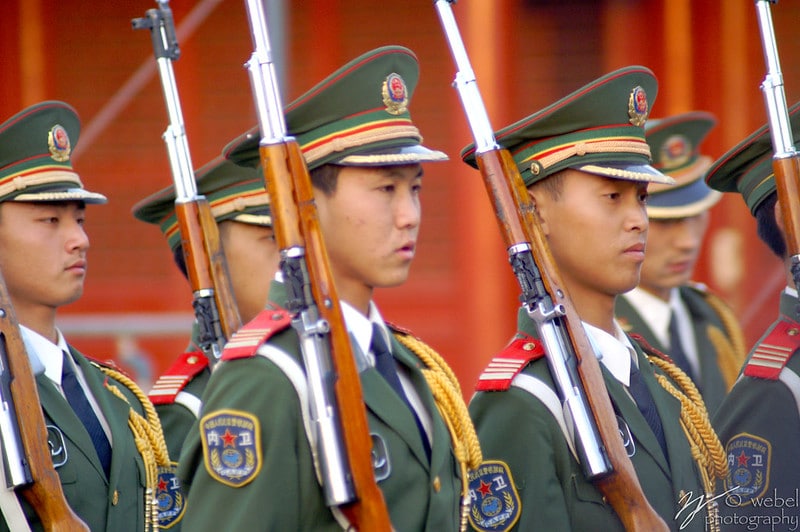Recently, there has been an increased desire among the military establishment in the United States to intervene in the event of a Chinese invasion of Taiwan. Such a push has been made by politicians, public figures, and talking heads from both sides of the political spectrum. Massive spending bills aimed at “countering” China tend to pass through Congress with ease, with the only real opposition coming from congressmen who don’t think they’re strong enough. Promises by the Biden administration to defend Taiwan in the event of a Chinese invasion have brought tensions with China to their highest point in generations.
Of course, as anyone reading this article should know, the foolishness of going to war with China over Taiwan is virtually incomprehensible. China, as of the time of this writing, has hundreds of nuclear warheads in their arsenal, the majority of which are fusion weapons. China has promised to declare total war on the United States, even potentially escalating to the use of nuclear weapons, if the U.S. does so much as dock a warship in Taiwan.
To fully understand the way Chinese people look at this topic, one must first understand a little history. In the 1930s, China was involved in a civil war between two main groups: the Chinese Communist Party (CCP), led by Mao Zedong, and the Nationalist Party, or Kuomintang (KMT), led by Chiang-Kai Shek. The human rights violations perpetrated by Mao Zedong and the Communist Party are well known by most in the West, having starved people to death by the millions in the later “Great Leap Forward” period and executing countless political opponents.
However, the human rights violations of Chiang Kai-Shek are not as well known. Chiang executed his political opponents by the millions during the Civil War period. Additionally, the scorched-Earth policies used by the KMT during the Civil War and World War II killed millions more, in addition to even more millions of people who died as a result of corruption within the agricultural system and mis-allocation of food. Given that the KMT ruled over the majority of China at this point in time, it is reasonable to assume that the Chinese people would be willing to accept any alternative to their rule, even from people as unethical as the Communist party.
At the end of the Chinese Civil War, the U.S. military built up defenses around Taiwan and prevented the PRC from taking the island, leaving it de facto independent to this day. Given the history of relations between the two countries, one can understand just why the Chinese view Taiwan so negatively. In the eyes of most Chinese (and certainly the CCP) Taiwan is as bad as Nazi Germany is to us. Given Chiang Kai-Shek’s human rights record, they weren’t really all that wrong for a time.
China has promised to invade Taiwan as soon as they declare independence. Any intervention by the United States on Taiwan’s behalf will be viewed by the Chinese government as an invasion of Chinese territory which any use of force is justified to repel. Chinese diplomats have already called for nuclear strikes to be done on the United States should they intervene, preemptively if necessary. As such, no moral hazards should be given to Taiwan through war guarantees by the U.S. in order to prevent such a declaration, as well as incentivizing the ROC to adhere to the 1992 “One China, Different Interpretations” consensus which has been governing cross-strait relations for the last few decades.
Obviously, Taiwan is far from Nazi Germany and the Chinese perception of them is objectively incorrect. However, that is exactly why a Chinese invasion of them may be undertaken. Right now, the PRC can claim that the Taiwanese people live under an authoritarian, unpopular government and yearn to reunify with China. However, if Taiwan were to withdraw it’s claims on all of China and officially declare independence, it would lead to the people of China beginning to question why democratic, independent Taiwan is doing so much better economically and socially than China is. Thus, a Chinese invasion of Taiwan as soon as the country declares independence is almost required by the CCP, regardless of American defense promises, as such an operation will need to be done while it still has the majority support of the Chinese people, in order to maintain the CCP’s internal control.
Furthermore, it is not unrealistic to expect China to escalate even further. The U.S. intervening in Taiwan will send a strong signal to the Chinese military establishment: the United States and other western countries will not stop countering China until the CCP is removed from power. For those in the CCP who believe their own propaganda, this will be the start of an invasion of China by the U.S. similar to their backing of Chiang-Kai Shek during the Chinese Civil War. However, even for those that don’t, the consequences are grave. Given the fact that the end of the previous Cold War saw the dissolution and impoverishment of the Soviet Union, and the Chinese leadership’s own self-interest, it is virtually impossible that the PRC government or the majority of Chinese citizens will ever agree to such terms. As such, China’s only choice, should they deescalate following an invasion of Taiwan, will be a costly cold war with the United States which would lead to a new arms race. What this means is that China will be forced to choose between a bloody nuclear war now, or an even bloodier one later. And while China does have a no-first-use nuclear policy (which America does not), we all know what words on paper really mean.
Furthermore, as unfortunate as it may be, the CCP has the majority support of the Chinese population. Fighting a war of this kind virtually always increases the support that a government has among its people. Thus, most Chinese will support the CCP in any actions they may take. They will wholeheartedly believe that America wants to put them back under the rule of Chiang-Kai Shek, making any kind of negotiation virtually impossible. And when a majority of Americans, even those who are supposedly anti-government and anti-war, enjoy memes about how “China is West Taiwan,” such concerns are not unjustified from their perspective.
It is clear, given the history of tensions between the two nations, a U.S. intervention in this matter would be suicidal. By current estimates, a nuclear war using just currently-deployed nuclear warheads would kill around 10-15% of the world’s population and leave the rest living in close to absolute poverty for decades. There’s no doubt that Russia, another reliable subject of the military establishment’s fear mongering, would get involved in such a war, seeing as how fallout, nuclear winter, and economic collapse would undoubtedly affect them as well, in addition to their large arms manufacturing industry making them a target and military commitments with China through the Shanghai Cooperation Organization (SCO).
If there’s even a 1% chance that going to war over Taiwan, which has a population of about 24 million, leads to nuclear exchange, it’s not worth it. Of course, the odds of U.S. intervention in Taiwan going nuclear are far more than 1%. They are arguably close to 100%. The idea that every nation on the planet is a Nazi Germany-like ultra-nationalist state, eager to invade and conquer the U.S. as soon as it lets its guard down, is nothing but a lie put out by the military-industrial complex.
If the PRC truly was a group of ultra-nationalists bent on fulfilling a dream of Chinese territorial expansion, then an invasion of Mongolia would be a good sign that this is the case. Mongolia has a population smaller than China’s military, and it was historically part of China under the Qing dynasty. Instead, the PRC has virtually always been opposed to such moves, as was demonstrated by their withdrawal following victory in the Sino-Indian war. The Chinese economy is nowhere near fit to lead any sort of global hegemony. Programs like the Belt and Road initiative are largely propaganda projects, meant to create a positive perception of the CCP through them aiding poor countries, and have substantially decreased in scale during recent years. It is also telling that China has 4 foreign military bases worldwide, compares to America having over a thousand.
China running English-language news sites, doing AstroTurfing campaigns on social media, or having hackers send files with viruses in them to the Pentagon are not grounds for a Cold War. Prior to U.S. entry into World War I and World War II, the Central and Axis powers were sinking U.S. cargo ships transporting weapons to Allied nations, killing hundreds of Americans in the process. Yet the U.S. did not enter either conflict until years after this started, nor should it have for reasons which are too complicated to get into in this article.
It should be clear by now that any attempts to get America into a new cold war with China are as foolish as can be. The deaths which could result from such a conflict exceed those which occur in the most gruesome, childhood-scarring horror movies by a factor of millions. If one were to bring up to a typical conservative that a nuclear war with China would result in cities such as Los Angeles and San Francisco being lost, there’s a good chance they’ll say something along the lines of “Well, I don’t mind losing those left-wing cities!” They largely mean this sarcastically, as few of them also think that 9/11 happening in liberal New York City was a good thing. However, the fact that making a joke about 9/11 being a good thing to these same people would likely be massively offensive to them is a perfect example of the cognitive dissonance that drives American foreign policy. When those people go out and vote, they are voting for politicians who think exactly the same way they do and decide American policy towards China. Thus, the sarcasm becomes reality.
Of course, it is not only conservatives who are affected by this, but liberals just as much, albeit for different reasons. All of this should be an indication to you that a cold war with China will bring nothing but pain, suffering, and unnecessary risk to the world. Do not allow yourself to succumb to war propaganda. Taiwan only exists as a nation because of unnecessary U.S. interventionism. We owe it to China (and Taiwan too, for that matter) not to get involved in their affairs and allow them and Taiwan to resolve this conflict peacefully. Taking sides is not the way to go about this and will only lead to further escalations.































